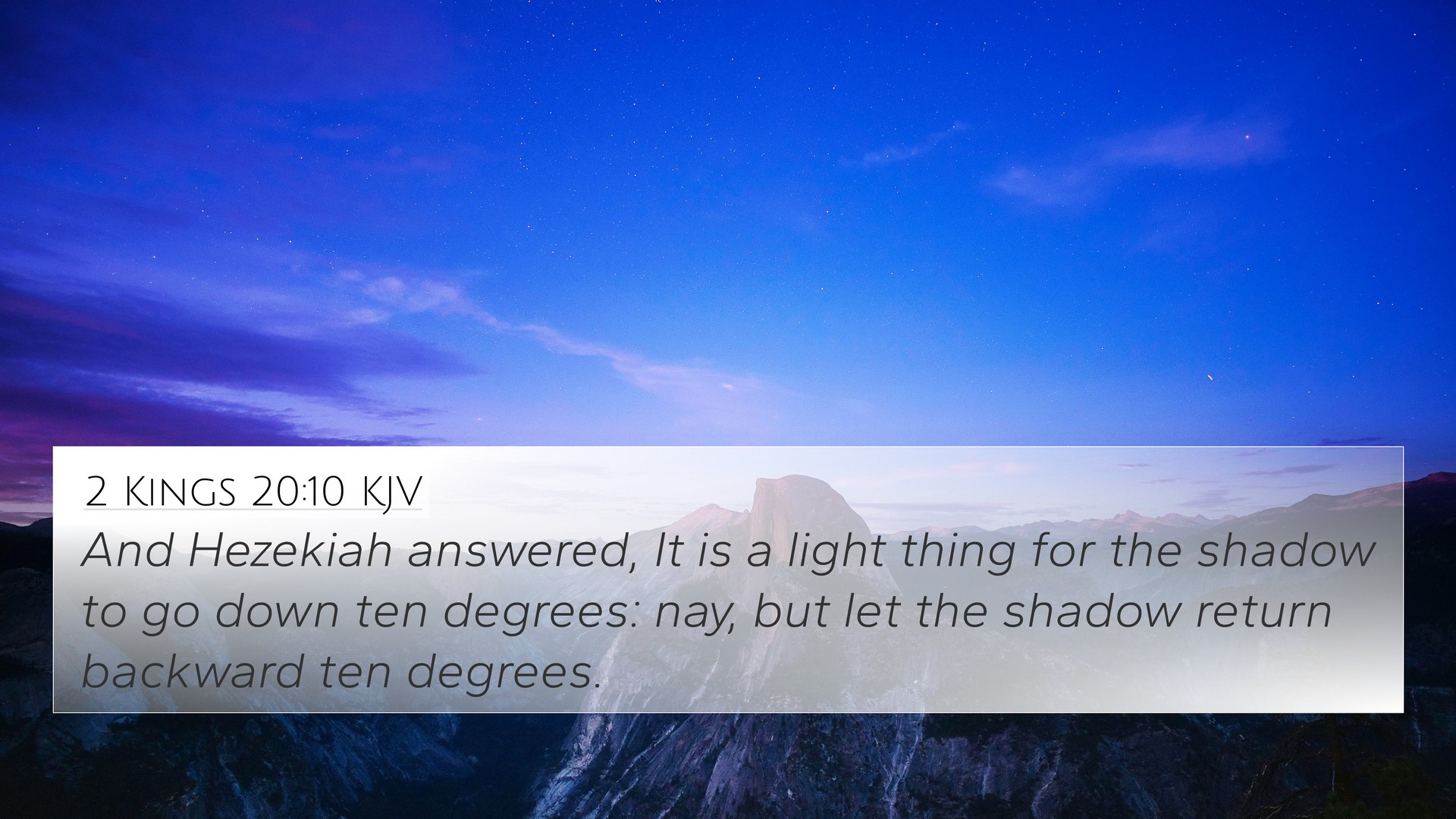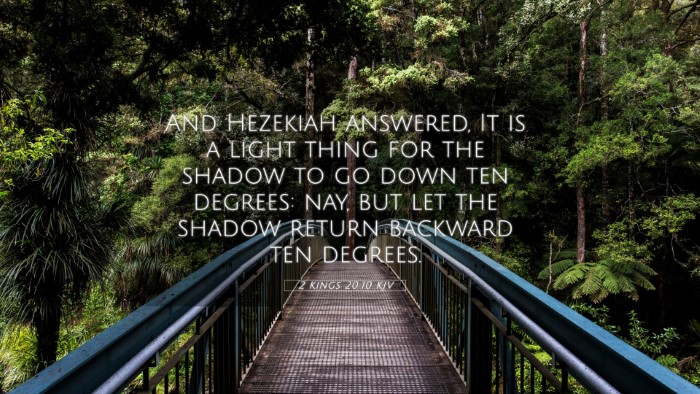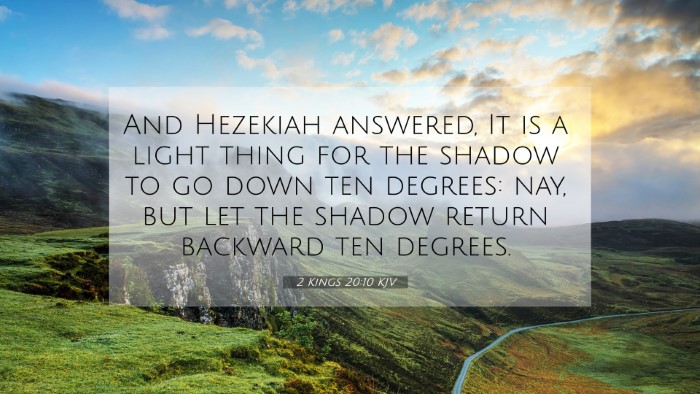Old Testament
Genesis Exodus Leviticus Numbers Deuteronomy Joshua Judges Ruth 1 Samuel 2 Samuel 1 Kings 2 Kings 1 Chronicles 2 Chronicles Ezra Nehemiah Esther Job Psalms Proverbs Ecclesiastes Song of Solomon Isaiah Jeremiah Lamentations Ezekiel Daniel Hosea Joel Amos Obadiah Jonah Micah Nahum Habakkuk Zephaniah Haggai Zechariah Malachi2 Kings 20:10 Similar Verses
2 Kings 20:10 Cross References
And Hezekiah answered, It is a light thing for the shadow to go down ten degrees: nay, but let the shadow return backward ten degrees.
Uncover the Rich Themes and Topics of This Bible Verse
Listed below are the Bible themes associated with 2 Kings 20:10. We invite you to explore each theme to gain deeper insights into the Scriptures.
2 Kings 20:10 Cross Reference Verses
This section features a detailed cross-reference designed to enrich your understanding of the Scriptures. Below, you will find carefully selected verses that echo the themes and teachings related to 2 Kings 20:10 KJV. Click on any image to explore detailed analyses of related Bible verses and uncover deeper theological insights.
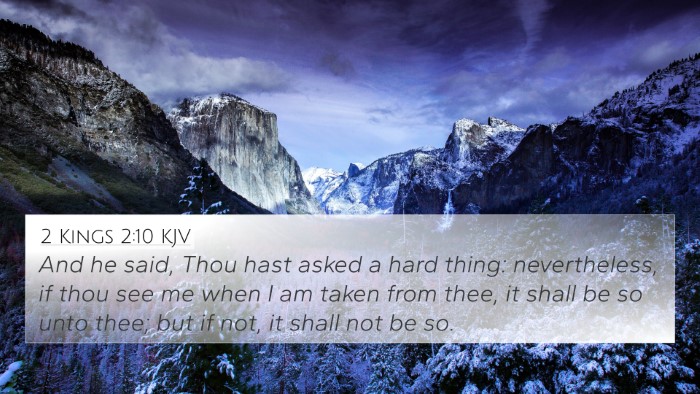
2 Kings 2:10 (KJV) »
And he said, Thou hast asked a hard thing: nevertheless, if thou see me when I am taken from thee, it shall be so unto thee; but if not, it shall not be so.
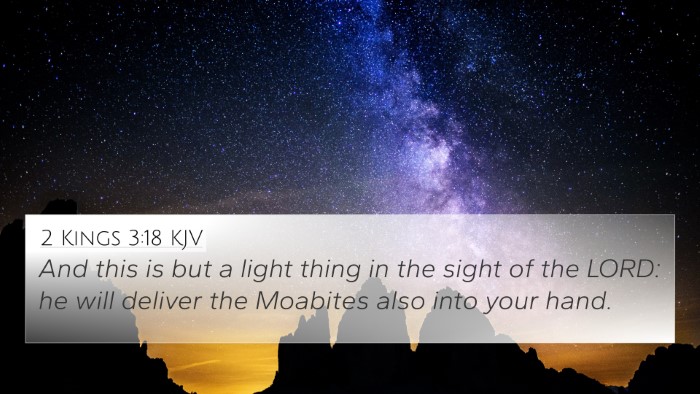
2 Kings 3:18 (KJV) »
And this is but a light thing in the sight of the LORD: he will deliver the Moabites also into your hand.
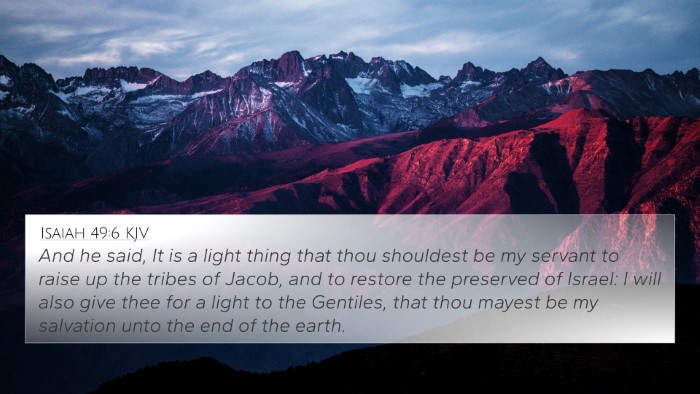
Isaiah 49:6 (KJV) »
And he said, It is a light thing that thou shouldest be my servant to raise up the tribes of Jacob, and to restore the preserved of Israel: I will also give thee for a light to the Gentiles, that thou mayest be my salvation unto the end of the earth.
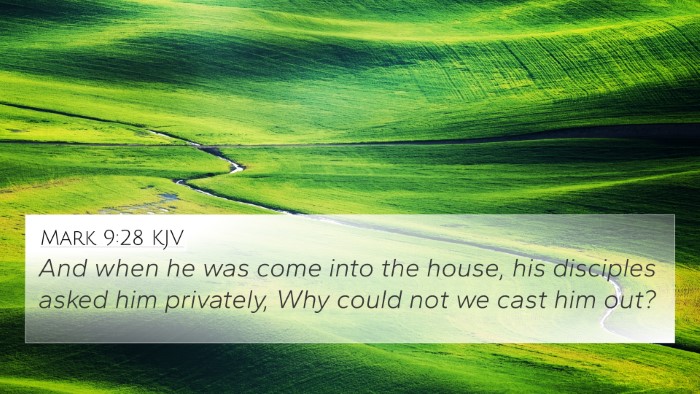
Mark 9:28 (KJV) »
And when he was come into the house, his disciples asked him privately, Why could not we cast him out?
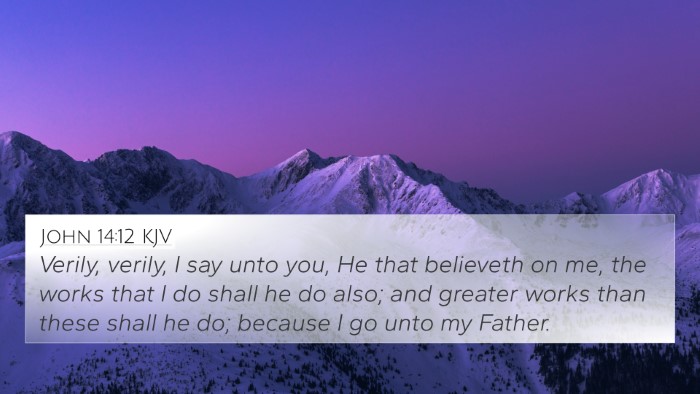
John 14:12 (KJV) »
Verily, verily, I say unto you, He that believeth on me, the works that I do shall he do also; and greater works than these shall he do; because I go unto my Father.
2 Kings 20:10 Verse Analysis and Similar Verses
Understanding 2 Kings 20:10
Bible Verse: 2 Kings 20:10 - "And Hezekiah answered, It is a light thing for the shadow to go down ten degrees: nay, but let the shadow return backward ten degrees."
Summary of Meaning
In 2 Kings 20:10, King Hezekiah responds to the prophet Isaiah's prophecy of God's promise to extend his life. When Isaiah tells him that God will cause the shadow on the sundial to go backwards as a sign, Hezekiah reflects on the nature of the miracle and acknowledges that altering the shadow by ten degrees is indeed a trivial matter. He requests a more significant sign, showing his desire for an even greater display of divine power.
Commentary Insights
This verse is rich with meanings as interpreted by various scholars:
- Matthew Henry: Henry emphasizes Hezekiah's faith, suggesting that the king's request for a miraculous sign reveals both his humility and his boldness in asking for God's intervention. He views Hezekiah as a man who understands the power of God’s will and seeks reassurance through tangible evidence.
- Albert Barnes: Barnes highlights the extraordinary nature of God’s grace and how the miracle serves to boost Hezekiah's faith. He compares the backward movement of the sun's shadow to situations where God goes above and beyond the expectations of human understanding.
- Adam Clarke: Clarke articulates the significance of the sundial in relation to time and God’s control over it. He remarks on Hezekiah’s lack of comprehension regarding the profound implications of the miracle, instead focusing on the practical aspects of time measurement.
Cross References
This verse relates to several other scriptures that enrich its understanding:
- Isaiah 38:1-8: The context of Hezekiah's sickness and God's promise.
- 2 Chronicles 32:24-26: The account of Hezekiah’s illness and recovery.
- Joshua 10:12-13: God altering the day for Israel’s victory, demonstrating His control over time.
- Isaiah 7:14: A prophecy of miraculous signs, paralleling God's intervention in human affairs.
- Luke 1:37: Reinforcing that nothing is impossible with God, similar to Hezekiah’s experience.
- James 5:16-18: The power of prayer, showing how Hezekiah’s appeal to God led to miraculous outcomes.
- John 11:40: Jesus discussing belief and God’s glory, akin to the faith Hezekiah displays by asking for the sign.
Connecting Themes
When analyzing this verse in the context of the Bible, several themes and motifs become evident:
- Faith and Assurance: Hezekiah's response reflects a deep faith while also seeking reassurance from God.
- Divine Authority: The movement of the sundial showcases God’s sovereignty over natural laws.
- The Nature of Miracles: This passage encourages meditation on what constitutes a miraculous sign of divine favor.
- Prayer and Intercession: It highlights the power of asking God for signs, reflecting a relationship built on faith and communication.
Thematic Connections Across the Bible
2 Kings 20:10 provides insights not just into the life of Hezekiah but also serves as a basis for understanding God’s intervention in various scriptural narratives:
- The Old and New Testament: Both testaments contain instances where God demonstrates His power through miraculous signs, such as the plagues in Exodus and the miracles of Jesus.
- Prophetic Literature: The request for signs ties back to the prophetic tradition of seeking confirmation and assurance from God.
- Human Vulnerability: Hezekiah's illness and plea highlight human frailty and the need for divine support.
- God's Promises: Hezekiah’s story underscores the theme of divine promises fulfilled and the faith that underlies those experiences.
Cross-Referencing in Biblical Study
To fully appreciate 2 Kings 20:10, understanding the art of cross-referencing is essential. This method allows for deeper insights into how scriptures illuminate one another. Here are some tools and approaches:
- Bible Concordance: Utilize a concordance to find words and themes that connect different passages throughout the Bible.
- Cross-Reference Bible Study: Engage in a structured cross-reference study to align verses conceptually.
- Bible Reference Resources: Consider comprehensive guidebooks that provide lists of related passages.
Conclusion
2 Kings 20:10 serves as a powerful reminder of God’s sovereignty and the importance of faith in understanding divine workings. Through cross-references, one can see how Hezekiah’s experience is part of a larger tapestry of biblical themes that include the miraculous, the relational aspect of prayer, and the promises of God. A thorough analysis and exploration of related scriptures lead to a richer understanding of the interconnectedness of Biblical texts.
